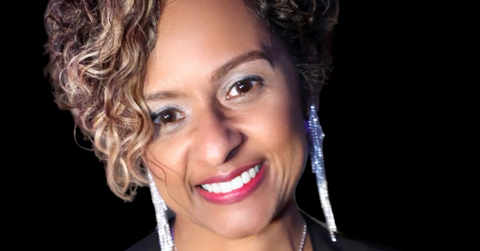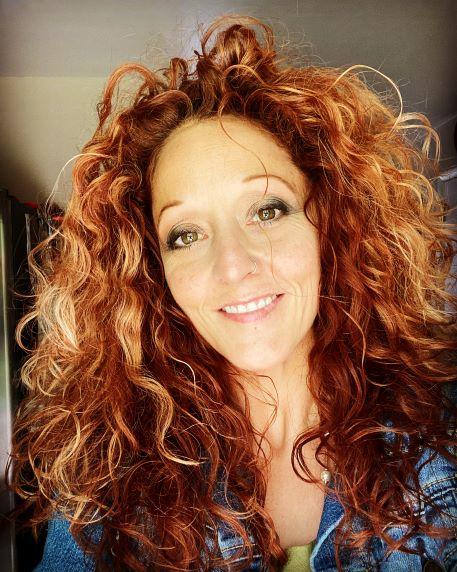With 50 years of hip-hop under our belts now, it’s exciting to see how the culture is influencing the world far beyond just the beats and bars. Hip-hop is everywhere, and a key thread within the fabric of culture across the globe.
But it’s not just the music we grew up on that’s making bold moves and showing up in new ways. The artists and industry greats themselves are stepping up and out of their usual spaces to make different kinds of changes to and for the culture. Shanti Das is among them.
Shanti’s music industry career began over 30 years ago, working closely with hip-hop legends like Outkast, Usher, and TLC. She started her professional rise as an Urban Promotions Assistant at Capital Records in 1991, and just 7 short years later, was named “Music Executive of the Year” by Impact Magazine. She continued to impact the hip-hop scene and culture for the next decade+ with other major labels like Sony Music Atlanta, LaFace Records, Arista Records, and Columbia Records, finalizing her iconic climb as Executive Vice President of Urban Marketing and Artist Development at Universal Motown in 2009.
But just as hip-hop itself has evolved, so has Shanti. These days her conversations with industry greats are a little less “hip-hop” and a little more “human.”
In 2014, Shanti was hit hard when a close friend ended her own life. Through her grief process, she recognized that she had some unhealed wounds from her own father’s suicide when she was just 7 months old. Although often considered taboo, Shanti turned to therapy and took a more intentional approach to her own mental and physical health.
Since then, she’s dedicated her life to repairing generational traumas and “silencing the shame” of asking for help. Her podcast, The Mibo Show (which stands for “mi” for mind, “bo” for body), gives the giants of hip-hop a platform to speak to the culture – real discussions, about real health issues, with real (famous) people. Her conversations showcase the simple fact that we’re all human, we all need a helping hand at times, and it’s more than okay to ask for it.
Her Agenda sat down with Shanti Das to dig a little deeper into her purpose and passions and she was not shy about sharing her journey.
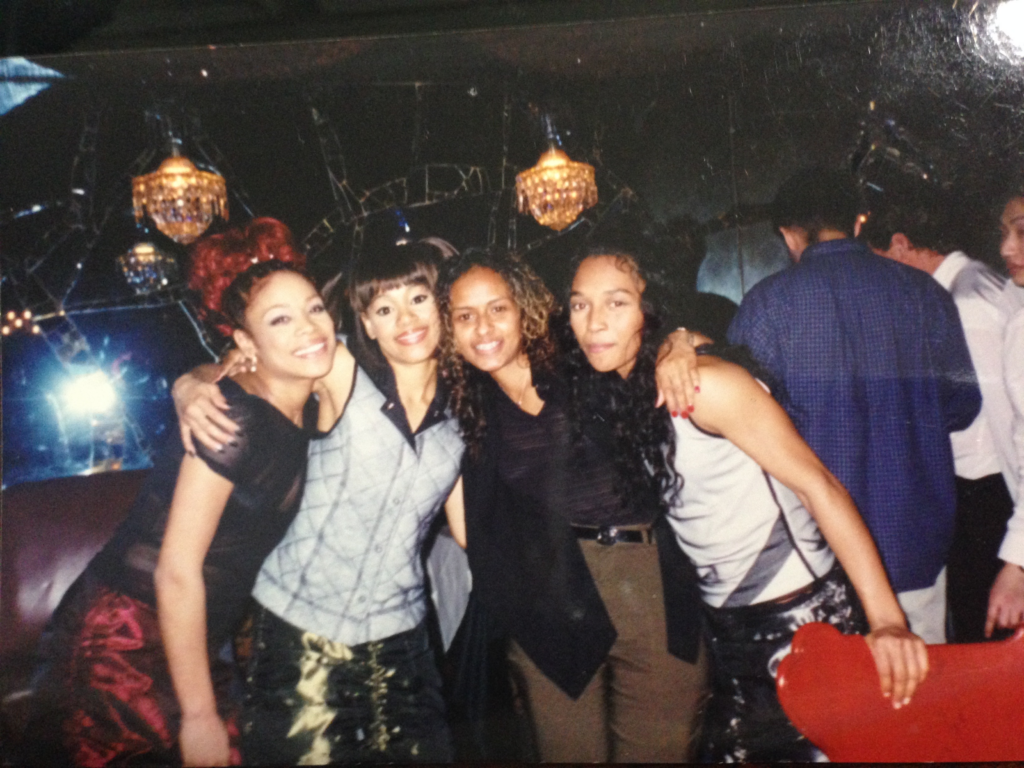
Her Agenda: Tell us a little about your history in the music industry.
Shanti Das: I got my start in the early ‘90s so I was in the entertainment industry for almost 20 years.
My first internship was at Capitol Records while I was a sophomore in college and I did that for 2 summers, working in the promotional department. That was back when MC Hammer was on the label, Young MC – really old-school artists.
Once I graduated from Syracuse in 1993, I got hired at LaFace Records in Atlanta, GA. The first record I ever worked on was Players Ball from Outkast. I did promotions on their first two albums and marketing on the last two. And I was actually at the Source Awards in 1995 when Outkast won and Dre uttered those infamous words, “The South got something to say.”
In the late ‘90s, I also brought Ludacris to L.A. Reid. He didn’t end up signing with LaFace Records, but I was one of the few people in Atlanta who really wanted to bring him to our label. Although I didn’t do A&R, I felt I had a pretty good ear for music.
Fast forward, when I went up to New York City, I did the marketing on Killer Mike’s first album, worked alongside Jermaine Dupri, and later, got to work with Busta Rhymes.
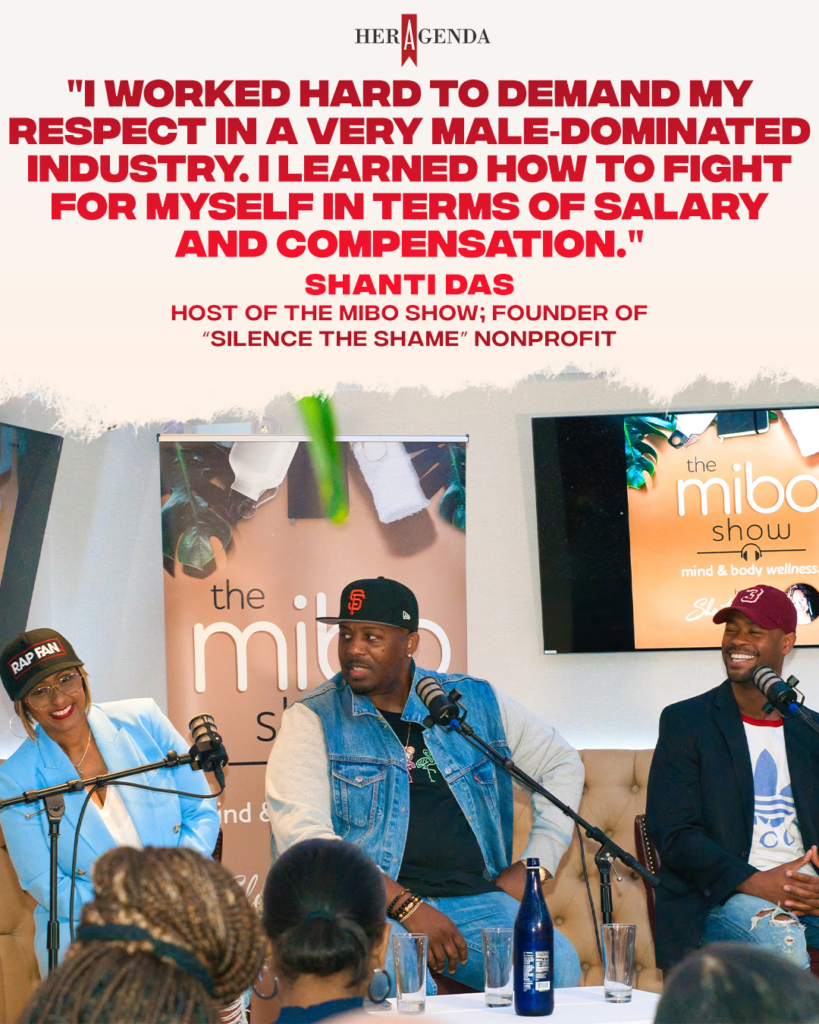
Her Agenda: What are some of the struggles you’ve faced in your climb?
Shanti Das: I worked hard to demand my respect in a very male-dominated industry. I learned how to fight for myself in terms of salary and compensation. I eventually figured out what it took in terms of getting an attorney and negotiating what I felt was my value.
And then also, not being afraid to ask for what I feel I deserve. I think oftentimes we can be complacent with what we’re given because we’re just happy for those opportunities. Whereas men, they’ll have these big pie-in-the-sky outlandish demands, but they ask for them and they get them. But half the battle is asking.
Her Agenda: Do you have any words of professional wisdom for women aspiring to be business leaders?
Shanti Das: We have to believe and feelthat we’re deserving and that we’re valued. I think that’s sometimes where we struggle. Women have to learn how to push forward and really exude that confidence. Really show that you deserve to be there. And the way you do that is by being so good, they can’t refuse you. There’s nothing better than hard work and determination – the statistics and the work will speak for itself.
I wrote a book about my career called‘The Hip Hop Professional – A Woman’s Guide To Climbing The Ladder of Success In The Entertainment Industry.‘ I stepped away from the industry but I learned a lot as a woman. I understood the importance of mentorship and having people to support me.
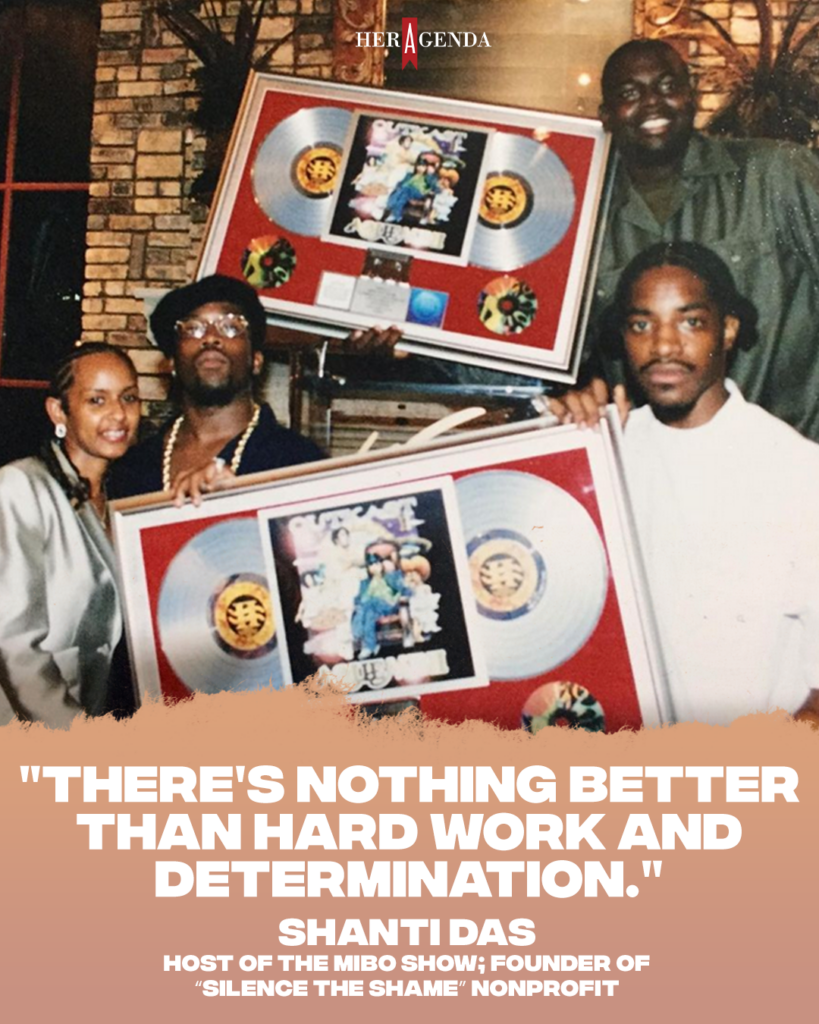
Her Agenda: Did spending so many years in the music industry impact your overall health?
Shanti Das: I was a workaholic and I had pretty much dedicated my life to this career. I think I’ve sacrificed a lot of family time, outings, and different things from a friend perspective. The first time I felt like the work was impacting my mental health was around 2010-2011. I [considered ending my life.] I don’t think I meant that at the time. I just was so stressed out, didn’t really have healthy ways to cope, and wasn’t really leaning on mentors. The number of hours I was working, the lack of sleep, and not eating properly – all of that was really taking a toll on my mental health.
Her Agenda: How did you manage the stress?
Shanti Das: I went to counseling for a couple of months and then threw myself back into the work – I should have stayed in there a lot longer. About five years later, I was diagnosed with cervical spinal stenosis. I thought I was going to have to have spinal surgery and my doctor said it was a direct result of stress – I was in my early 30’s. That’s when I knew it was a problem and I decided to walk away – at the height of my career, making a lot of money.
Then four years later, my best friend took her own life. That reallytook a toll on my emotional health and wellness, and in 2015, I came close to taking my own life.
As a community, we didn’t talk about mental health much growing up. Had I been better equipped with tools and really understood what therapy was like, or how antidepressants could have benefited me, who knows? The work that I’m doing now is definitelyimportant work for our community. But maybe had I been better equipped, the journey might not have been quite as tough.
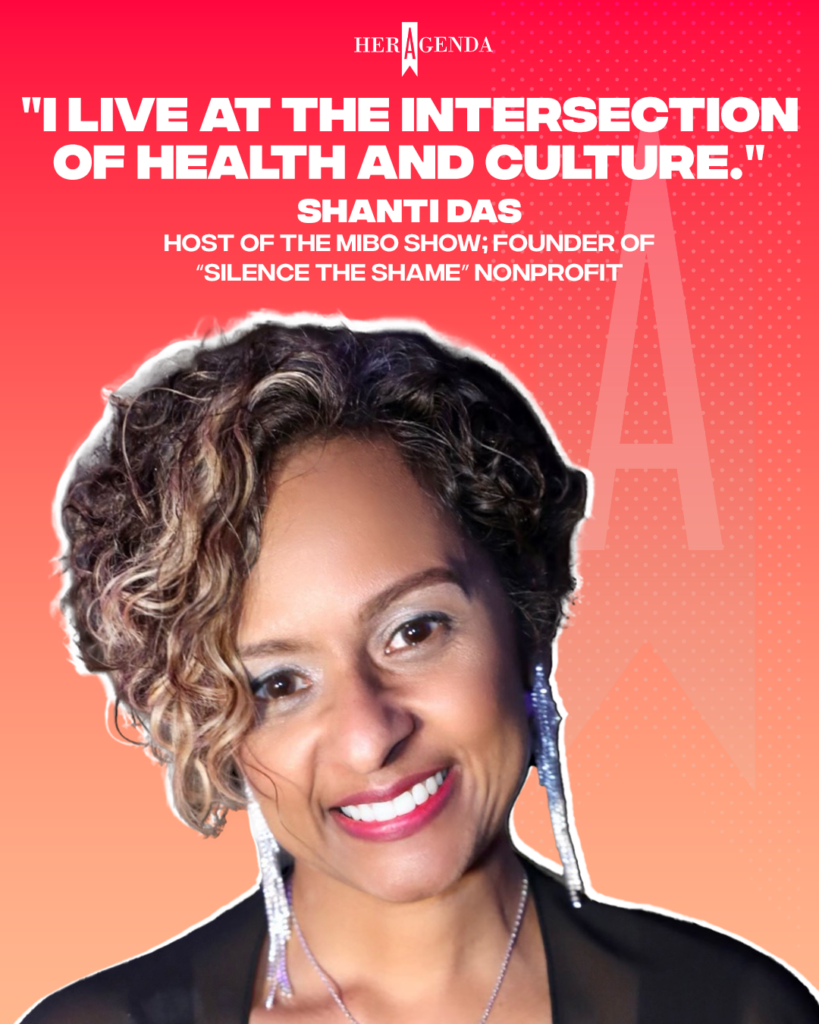
Her Agenda: What are some of the other ways you’re spreading your message?
Shanti Das: My nonprofit – Silence the Shame – is so important because we’re still knocking down stigmas. As well as my podcast, which I launched earlier this year – The Mibo Show. Being able to talk to others about their journeys and what they’re going through still goes a long way. If we see someone talking about their own struggles and opening up, saying how much therapy has helped them, or different things that they’re doing from a wellness perspective, that is something that we want to permeate in culture and society right?
I just want to do my part to really try to affect culture in a positive way and bring as many resources to the table, which is why I’m excited about my partnership with Johnson and Johnson. They supply medical experts for each episode of The Mibo Show and they’re really committed to bringing a lot of really wonderful resources to the community so I couldn’t do this work without them.
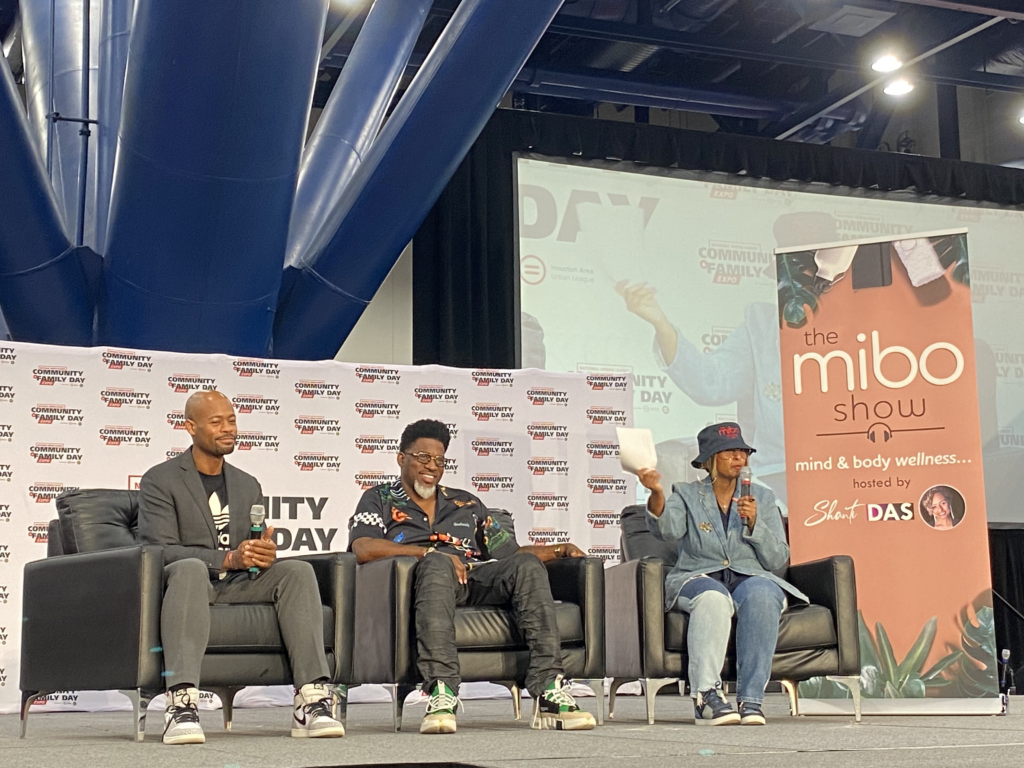
Her Agenda: Will there be a season 2 of The Mibo Show?
Shanti Das: I’m going to put it out there and say ‘yes, we’re going to have a season 2’ and God willing, we’ll be able to open up into other industries such as sports and entertainment. Maybe some actors and actresses, the fashion industry, and political icons – just keep these health conversations going.
[Editor’s note: This interview has been edited for length and clarity.]

